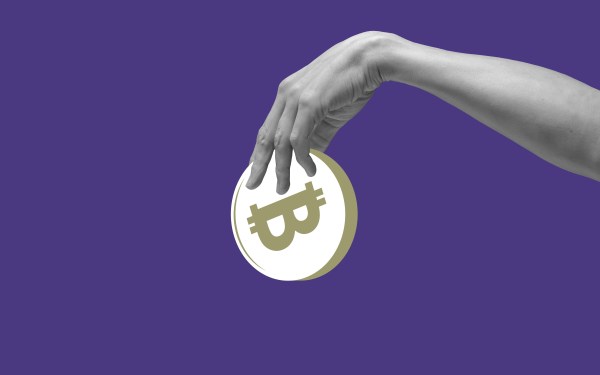
Important information
Don’t invest unless you’re prepared to lose all the money you invest. This is a high-risk investment and you should not expect to be protected if something goes wrong.
Cryptocurrency may be an investment to consider for those willing to accept it is a high risk gamble, and can afford to lose all of the money invested.
Prices plunged in 2022, so for investors considering crypto, it’s important they go into it with their eyes open.
Cryptocurrency is an extremely high risk investment, so investors should not put money in unless they’re prepared to lose all their money. Investors are also unlikely to be protected if something goes wrong.
In this article we explain:
Related content: Should investors consider investing in bitcoin?
This article contains affiliate links that can earn us revenue.


Is it a good idea to consider investing in cryptocurrency?
If one considers investing in cryptocurrency, they should do it based on the facts, not the hype — and there is a lot of hype.
Before investors consider buying or selling digital currency, they should know the risks so they can judge if investing is a good idea for them and their personal finances. Here, are some things that may help investors understand how cryptocurrency works.
The Bank of England would not agree that it is a good investment. Governor Andrew Bailey warned that people who invest should be prepared to lose all of their investment.
It’s not a good idea to invest in cryptocurrency unless investors are prepared to lose all the money they have invested.
This is because cryptocurrency is an extremely high risk and complex investment, and investors are unlikely to be protected if something goes wrong.
We also only provide this content for educational reasons. If one is thinking of investing in cryptocurrency or in any other investment, they may want to consider obtaining appropriate financial advice.
What are some of the risks of investing in cryptocurrency?
Governments and financial regulators in almost every country have warned investors of the risks posed by buying cryptocurrency.
And that the warnings have been so emphatic and widespread is partly down to the hype around digital currencies.
When an investment makes headlines for soaraway returns, is featured in advertisements or endorsed by celebrities as a way to get rich, investors can pile in without thinking through the possible consequences.
1. Volatility
Extreme volatility is a defining factor of cryptocurrency. While an investor may make high returns, they could also lose everything.
2. Scams
In November 2021, around £1 million–worth of cryptocurrency scams were being reported to Santander UK by its customers each month. The scale of crypto fraud overall will be much greater.
One of the most common types is when a criminal hacks into an investor’s computer and freezes them out of their account.
3. Exaggerated promises of high returns
Cryptocurrency firms may also be overstating how much investors could receive from investing in crypto, while minimising the high risks.
4. No compensation scheme
In the UK, deposits held with a regulated bank or building society are protected by the Financial Services Compensation Scheme. So if say, a bank or building society goes bust, compensation of up to £85,000 will be available to customers through the FSCS.
Crypto assets, however, are not regulated by the FCA, and so if the cryptocurrency exchange or platform where monies have been invested goes bust, it is unlikely that investors will get their money back.
For those wanting to get to grips with crypto investing, check out our article: Six cryptocurrency tips (and five mistakes to avoid).
“Some firms are offering investments in crypto assets that promise high returns. If consumers decide to invest, they should be prepared to lose all their money.”
Financial Conduct Authority, In January 2021
Is cryptocurrency a reliable way to consider making money?
Early investors in cryptocurrencies such as bitcoin will probably have made money, though bitcoin has experienced several crashes since its early days. If investors had spent £310 to buy one bitcoin in April 2016, six years later your investment would have been worth about £24,000 and back down to £3,500 in February 2019.
Investors should remember : past performance is not an indicator of future results.
The price fluctuations for even the most popular cryptocurrency highlight the extreme volatility of crypto investment.
Some new cryptocurrencies were said to be intended to replace traditional currencies such as pounds or dollars. Others were described as intended to be used to create new types of financial application, or swap value between various digital currencies.
If one is considering buying into digital assets, they should consider looking closely at projects individually to see how they might pan out in the future. But investors should remember: investing in cryptocurrency is extremely risky and investors should only invest what they can afford to lose.
What are average returns for cryptocurrencies?
There is no guarantee a cryptocurrency will remain in action in the long run.
For example, of the top ten cryptocurrencies by market value in 2013, only seven are still functioning today.
In 2013, one bitcoin was worth just under $112, and the currency had a total market value – all the bitcoins in circulation multiplied by the price of each one – of just over $1.2bn.
On 16 May 2022, one bitcoin was worth about $30,000 and had a total market value of $1.3 trillion.
Eight years ago, one litecoin was worth $3.38. In April 2021, it commanded a value of about $245 per coin. Now it is worth about $60.
Devcoin, novacoin and CHNCoin are no longer listed by the price-tracking website CoinMarketCap, while freicoin and terracoin have fallen in value and the latter is worth a fraction what it was in 2013.
There is a constant stream of new cryptocurrencies entering the market. For example, Dogecoin’s value took off in April 2021, started collapsing in May 2021 and has yet to return to those highs.
What type of an investment is Ethereum?
If the price of any asset rises rapidly, there is always a chance it could fall just as quickly.
Launched in 2015, it soared in value in the first few months of 2021, reaching a record high of $4,617. It then exhibited great price volatility, briefly falling below $1,000 in June 2022, and since then has repeatedly risen and fallen again between those values. At the time of writing its value is about $3,300.
It is still one of the most traded cryptocurrencies largely because it has more uses beyond just being a cryptocurrency. Still, this doesn’t make it any less volatile.
Ethereum is used in smart contracts on the blockchain networks crucial to cryptocurrencies, and payments company Visa recently said it would use it to record crypto payments.
But investors should remember there are no guarantees.
An important point to bear in mind about general investing is that investors typically lose money if they sell when the asset falls below the price they paid for it, as one ends up crystallising one’s losses. However, with crypto investing, the value of any given cryptocurrency can drop to zero. Read more in our beginner’s guide to investing.
Is bitcoin a potential inflation hedge to consider?
Some investment pros have been talking about digital currency as a way for investors to potentially hedge against inflation.
When inflation rises, as it has done recently, the value of one’s cash falls. As the years pass, consumers can buy fewer goods and services with the money in their bank accounts.
Investment options touted as a “hedge” are ones that tend to either:
- Keep more of their purchasing power than cash over the long term
- Or they tend not to be affected by declines in other parts of the economy
The first of these potential advantages could also be applied to the stock markets. That’s why so much long-term investment advice is focused on moving cash out of our bank accounts and into stocks and shares that have the potetial could appreciate over time (or fall in value).
Baked into the bitcoin code is the promise that no more than 21 million units of bitcoin will ever be created. So instead of being an inflationary currency like sterling or dollars, some experts argue bitcoin is the opposite: it is deflationary, increasing in value with the passing of time.
On the other hand, where price movements of stocks and shares may well be influenced by the performance of the business, bitcoin has no underlying asset.
This means that the movements in its price are based purely on speculation among investors about whether it will rise or fall in future.
As a result, there can be violent swings in the price of bitcoin, even in the space of 24 hours.
Current evidence suggests little-to-no correlation between high inflation and the price of bitcoin.
Also, the deflationary argument in favour of bitcoin potentially falls down if governments decide to regulate specifically against it.
The regulatory uncertainty that surrounds bitcoin, and cryptocurrency in general, is one of the reasons so many investors discount it entirely.
Cryptocurrency is not regulated in the UK. The UK regulator, the Financial Conduct Authority, has repeatedly warned investors that they risk losing all their money if they buy cryptocurrency, with no possibility of compensation.
Should I invest in bitcoin?
*All products, brands or properties mentioned in this article are selected by our writers and editors based on first-hand experience or customer feedback, and are of a standard that we believe our readers expect. This article contains links from which we can earn revenue. This revenue helps us to support the content of this website and to continue to invest in our award-winning journalism. For more, see How we make our money and Editorial promise.
Important information
Some of the products promoted are from our affiliate partners from whom we receive compensation. While we aim to feature some of the best products available, we cannot review every product on the market.



